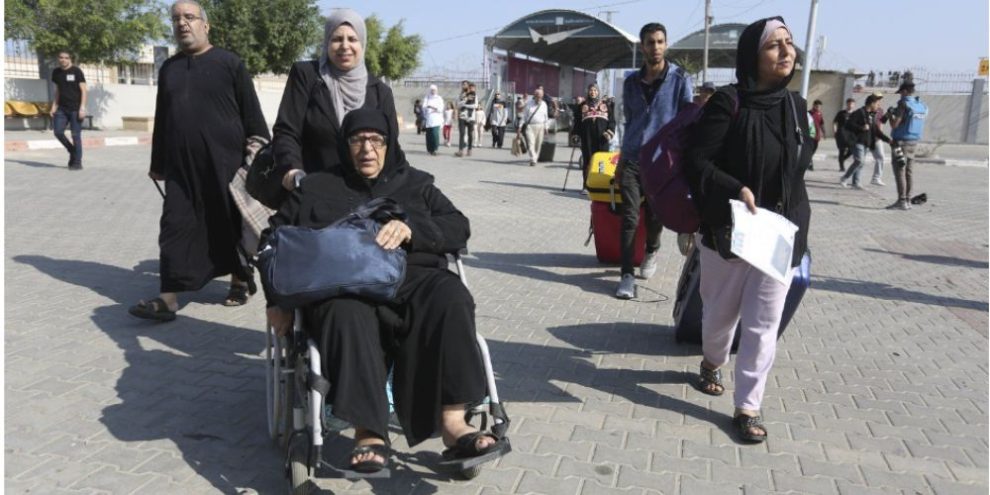
By Fakiha Baig in Toronto
Foreign Affairs Minister Mélanie Joly said Wednesday she is in touch with several of her counterparts in the Middle East about the possibility of more foreign nationals being able to leave the Gaza Strip — after the first group allowed to exit since the latest Israel-Hamas war began did not include any Canadians.
The situation has Canadians stuck in the besieged Palestinian territory asking what their federal government is doing to help them escape.
An agreement appeared to have been reached to allow certain foreign passport holders, along with some wounded individuals, to leave Gaza on Wednesday via the Rafah border crossing for Egypt. A list published by the General Authority for Border Crossings in Gaza included citizens of Australia, Austria, Bulgaria, the Czech Republic, Finland, Japan and Jordan — but not Canada.
In Ottawa, Prime Minister Justin Trudeau said the government was calling for its citizens to be allowed out.
"We of course continue to unequivocally condemn Hamas's abhorrent terrorism and Israel has the right to defend itself, but the price of justice cannot be the continued suffering of all Palestinian civilians," he said.
"We're calling (for) the liberation of hostages, on aid to flow in and on Canadians and their families to get out of Gaza through the Rafah crossing."
In Montreal on Wednesday, Joly said she had heard there could be another opportunity on Thursday, although she did not say whether that would include Canadians.
"There seems to be an agreement. We'll see whether it holds, because things are very fluid," Joly said in French after giving a speech to the Montreal Council on Foreign Relations.
"There are a few nationals who came out today. I hear that there could be more tomorrow, so that's why I'm in contact with my Israeli, Egyptian and also Qatari counterparts."
Global Affairs Canada has not immediately responded to a question about why no Canadian citizens were on the list of foreign nationals allowed to leave so far.
Liberal MP Rob Oliphant, the parliamentary secretary to Joly, said Wednesday that the federal government has been "negotiating with a number of partners" to get Canadians out, and that he is "very hopeful" that will happen "in the next few days."
Oliphant said consular staff have been working around the clock, but sometimes cannot reach Canadians due to internet-connectivity issues in Gaza.
Mansour Shouman, a Canadian in Gaza with his wife and five children, said he couldn't understand why Canada appeared to be so far behind several other countries.
"Shame on them," he said of the Canadian government in a phone call, as the sounds of sirens and people scrambling could be heard in the background while he sheltered at a hospital in southern Gaza.
"This is not the Canadian government that we elected that supports human rights. They've been very active in evacuating Israeli-Canadians since the first day. History will not forget what they are doing."
Shouman called on Canadians to pressure Ottawa to help evacuate citizens faster from Gaza and speak up against the war.
The federal government organized evacuation flights from Israel last month for Canadian citizens, permanent residents and eligible family members.
Global Affairs Canada has also said it has helped 65 citizens, permanent residents and eligible family members leave the West Bank, another Palestinian territory, since the conflict began, and it is in touch with 70 people who are still there.
Shouman, who was born in Gaza, lived in Calgary for more than a decade and became a Canadian citizen in 2006, moved back to Gaza three years ago. He said he is hoping his wife and children will be able to evacuate, while he remains behind.
"I cannot leave the Palestinian people here going through what they're going through," he said.
Mahmoud Saleh, a Canadian citizen in Gaza with his pregnant wife, said he was disappointed in his government and wanted to leave as soon as he could.
"I don't know what they're waiting for," Saleh said, adding he has not heard from the Canadian government for more than two weeks.
"Everything is unbelievable. The scenes are insane … everybody's in tents, there's no power. There's a big water problem. It's insanely dense." Saleh said he escaped to a refugee camp two days ago after a bomb dropped 30 metres from the home he was sheltering at and he was hit by shrapnel.
"I was lucky I survived," he said.
Dalia Salim, a resident of London, Ont., who is trying to get her 66-year-old Canadian father out of Gaza, also questioned why no Canadians were among the first group of foreigners allowed out of the enclave.
"Authorities from the Czech Republic, Finland, Australia, Japan, a few other countries have managed to get their people out," she said.
"I would have assumed that the moment they announced the border would open, Canada should have had that on their top priority and tried to get their people out."
Salim, who has been in touch with Global Affairs on behalf of her father, called communications from the Canadian government disorganized and said she was previously receiving emails for evacuations out of Israel, despite her father being in Gaza.
"The process has been very, very, very unorganized. And you're putting people at risk because of this disorganization," she said, adding that her father was in Gaza trying to help his elderly mother and was unable to wait indefinitely at the border crossing.
"My dad spends his day trying to find clean water and canned food for the family. That's literally how he spends his day."
A spokesperson for the Palestinian Crossings Authority said six buses carrying 335 foreign passport holders left Gaza through the Rafah crossing into Egypt as of mid-afternoon Wednesday. The authority said the plan was for more than 400 foreign passport holders to leave for Egypt.
Gaza, home to 2.3 million people, is in the grip of a severe humanitarian crisis amid the siege imposed since an Oct. 7 attack by Hamas on Israel. Since 2007, Gaza has been controlled by Hamas, which Canada considers a terrorist organization. Over half the territory's population has fled their homes, and supplies of food, medicine, water and fuel are running low.
Over the weekend, Israel launched an expanded ground operation in Gaza while stepped-up bombardments knocked out telecom services to most of the territory and created a near-blackout of information in the area.
The Palestinian death toll in the Israel-Hamas war has reached 8,805, according to the Hamas-run Health Ministry in Gaza. In the occupied West Bank, 130 Palestinians have been killed in violence and Israeli raids.
More than 1,400 people in Israel have been killed, most of them civilians slain in the initial Oct. 7 attack by Hamas. In addition, around 240 hostages were taken from Israel into Gaza by the militant group.
Over 1,400 people have died on the Israeli side, mainly civilians killed during Hamas's initial attack, also an unprecedented figure. Palestinian militants also abducted around 240 people during their incursion and have continued firing rockets into Israel.
- with files from the Associated Press.
Banner image: Palestinians cross to Rafah on the Egyptian side of the border with Gaza Wednesday, Nov. 1, 2023. THE CANADIAN PRESS/AP/Hatem Ali
This report by The Canadian Press was first published Nov. 1, 2023.





